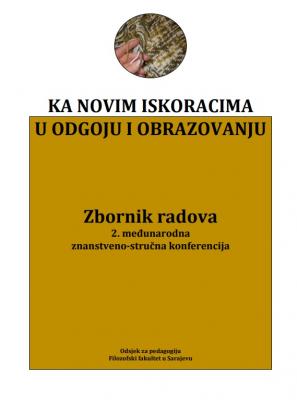JESU LI BUDUĆI NASTAVNICI SPREMNI ZA INTEGRACIJU OBRAZOVANJA ZA ODRŽIVI RAZVOJ U NASTAVU?
ARE FUTURE TEACHERS READY FOR EDUCATION FOR SUSTAINABLE DEVELOPMENT?
Author(s): Nena Vukelić, Nena Rončević, Anamarija VinkovićSubject(s): School education, Higher Education , Educational Psychology, Environmental interactions, Sociology of Education, Pedagogy
Published by: Filozofski fakultet Univerziteta u Sarajevu
Keywords: education for sustainable development; self-efficacy and readiness of (future) teachers to implement education for sustainable development; attitudes towards sustainable development;
Summary/Abstract: Education for Sustainable Development (ESD) refers to processes of integrating the principles, values and practices of sustainable development into all aspects of education in order to address the social, economic, cultural and ecological problems in the 21st century (UNESCO, 2015). One of the main priorities of the ESD is the education of future teachers who are often referred to as the most important agents of change in achieving the goals of sustainable development (UNESCO, 2017). Croatia is increasingly working on integrating sustainable development content into teacher education, however, it remains to be seen if the future teachers are ready to engage with or teach ESD. The aim of the present study was to examine the attitudes of 152 students – future teachers at the University of Rijeka towards sustainable development and their self-efficacy in teaching sustainable development. The data was collected during May and October 2017. Respondents show mostly positive attitudes towards sustainable development and deem ESD to be highly important. Their estimates of self-efficacy in ESD are somewhat lower, but in a positive correlation with attitudes toward (education for) sustainability. It has also been found that the greater the respondents’ awareness of the main environmental issues, the higher their estimates of their self-efficacy for ESD. In other words, student teachers who value (education for) sustainable development and have knowledge in that specific domain, are more willing and ready to implement aspects of sustainable development in their future work.
Journal: Zbornik radova Odsjeka za pedagogiju
- Issue Year: 2/2018
- Issue No: 2
- Page Range: 326-338
- Page Count: 13
- Language: Croatian

